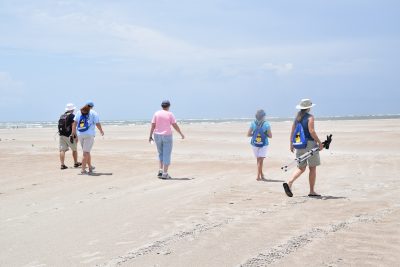Emerald Isle Shorebird Steward program needs volunteers for this year’s shorebird nesting season and monitoring of the least terns and Wilson’s plovers that nest on The Point in Emerald Isle.

Both least tern and Wilson’s plover are birds of concern in the state because of their declining population. Beach Stewards are working to both monitor the birds as well as educate beach goers about the birds and the importance of giving them protection.
Supporter Spotlight
Training for new and experienced volunteers is scheduled for 10 a.m. Thursday, May 24, at the Emerald Isle Community Center on Leisure Lane adjacent to Town Hall, 7500 Emerald Drive. After the training participants will go to The Point to get acquainted with the nesting area.
When Bogue Inlet was reconstructed by the Corps of Engineers a few years ago, it provided habitat for both species to nest and the colony has grown with the protection North Carolina Wildlife Resources Commission offers by roping off the nesting areas.
Diane Midness of Oriental is the steward volunteer organizer. Most of the volunteers are based in New Bern and Oriental but she is reaching out for more volunteers that reside closer to Emerald Isle. The stewards work in conjunction with the wildlife commission and have been working to protect this nesting colony for the last few years.
Beach-nesting birds congregate in colonies on the shore from April to August along the state’s barrier islands to breed, including terns and skimmers that nest in large groups called colonies, and shorebirds that nest singly. The birds’ nests are small divots in the sand sometimes lined with shell and debris and located above the high tide line on bare sand with little or no vegetation. The eggs and chicks are camouflaged to match the sandy environment, according to a release from the volunteer group.
These nesting areas are often disturbed because visitors are unaware that birds nest on the expanses of sand and that walking through the nesting area can harm the eggs or chicks. When nesting parents are disturbed and fly off of their sandy nests, it only takes minutes for chicks or eggs to die under the heat of the summer sun. Soon after hatching, the downy chicks leave their nests to spend time on beach for several weeks with their parents until they are old enough to fly and fend for themselves.
Supporter Spotlight
For further information and to register for the training, contact Diane Midness at dmidness@gmail.com







